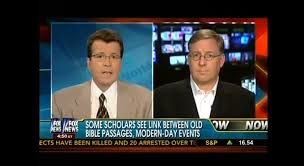 I came across an article on USA Today’s website that disturbs me–imagine that, finding something disturbing on the internet. Go figure.
I came across an article on USA Today’s website that disturbs me–imagine that, finding something disturbing on the internet. Go figure.
Anyway, the article is “Some see biblical visions of doom in Syria trouble.” The article itself is fine, since some quotes urge caution about reading current events on the pages of the Bible.
What’s disturbing is that such an article even needs to be written.
Apparently the logic of it all goes something like this:
Syria is mentioned in the Old Testament as an object of God’s wrath.
Hey…lookie here…why of all the darndest things…a country called Syria is part of the Middle East right now and its government is doing terrible things.
That means, clearly, that the Old Testament must be talking about our current events. After all, what other explanation could possibly account for this bizarre scenario? And so, what held then holds now: Syria needs to be bombed. I’m just going with what God says.
Ugh, sigh, and face palm.
Ancient Israel was in almost constant conflict with someone–and in the 9th and especially the 8th centuries, Syria was a major player.
Biblical prophets, like Isaiah, spoke to these international affairs. Chapter 17 of Isaiah is all about Damascus (i.e., Syria), and it begins:
See, Damascus will cease to be a city, and will become a heap of ruins. Her towns will be deserted forever.
The chapter ends with a promise that God will rebuke the nations, and:
Before morning, they are no more. This is the fate of all who dispoil us, and the lot of those who plunder us.
Damascus is God’s enemy because it is Israel’s enemy, and count on it, they will get theirs soon enough.
One of the bigger missteps in the history of the western Christian fundamentalist view of the Bible is the idea that the biblical records of ancient hostilities are simply veiled references for what is going on in whatever moment we happen to be living in.
the biblical records of ancient hostilities are simply veiled references for what is going on in whatever moment we happen to be living in.
I get the idea behind it: the Bible is God’s word that “speaks to me,” and so all of it, somehow, has to connect with me and my world right at this very moment. But this mentality freaks me out for several reason, including but not limited to the following:
1. This view assumes that believing that the Bible is God’s word implies it must somehow be all about us. That assumption is not born from the biblical texts themselves, which say no such thing, but stems from a spiritual self-centeredness that is wrapped up in layers and layers of self-insulating theological rhetoric.
Many Christians simply adopt this mentality, not because they are stupid or horrible people, but because of the Christin subculture in which they were raised, and they see no other way of being faithful to God.
2. This view misunderstands biblical prophets as being concerned with “end times prophecies.” They weren’t. Their focus was on what was happening in their world and what God would do about it in the near future in delivering Israel from her enemies and kicking the other nations butts–or happily allowing them to join the party if they bow the knee to Yahweh.
Think of prophets not as predictors of way, way in the future “end times” scenarios, but preachers bringing the word of God to their contemporaries. That’s what being a “prophet” meant in ancient Israel. If you read the prophetic literature as a personal letter to you and your world, you are abusing the texts.
3. This view encourages a view of God who is out to get the nations that are a threat to Israel, Christianity–or worse, America, which is simply assumed to be God’s special little patch of ground, a “new Israel.” What is lost in this rhetoric is all the Jesus stuff, where tribal culture is left behind and the people of God are to be agents of peace and healing among the nations.
The crisis in Syria is tragic. Something needs to be done, and something likely will–hopefully a peaceful solution.
Just don’t drag Israel’s ancient conflicts with Syria into it and call it God’s will for today.
